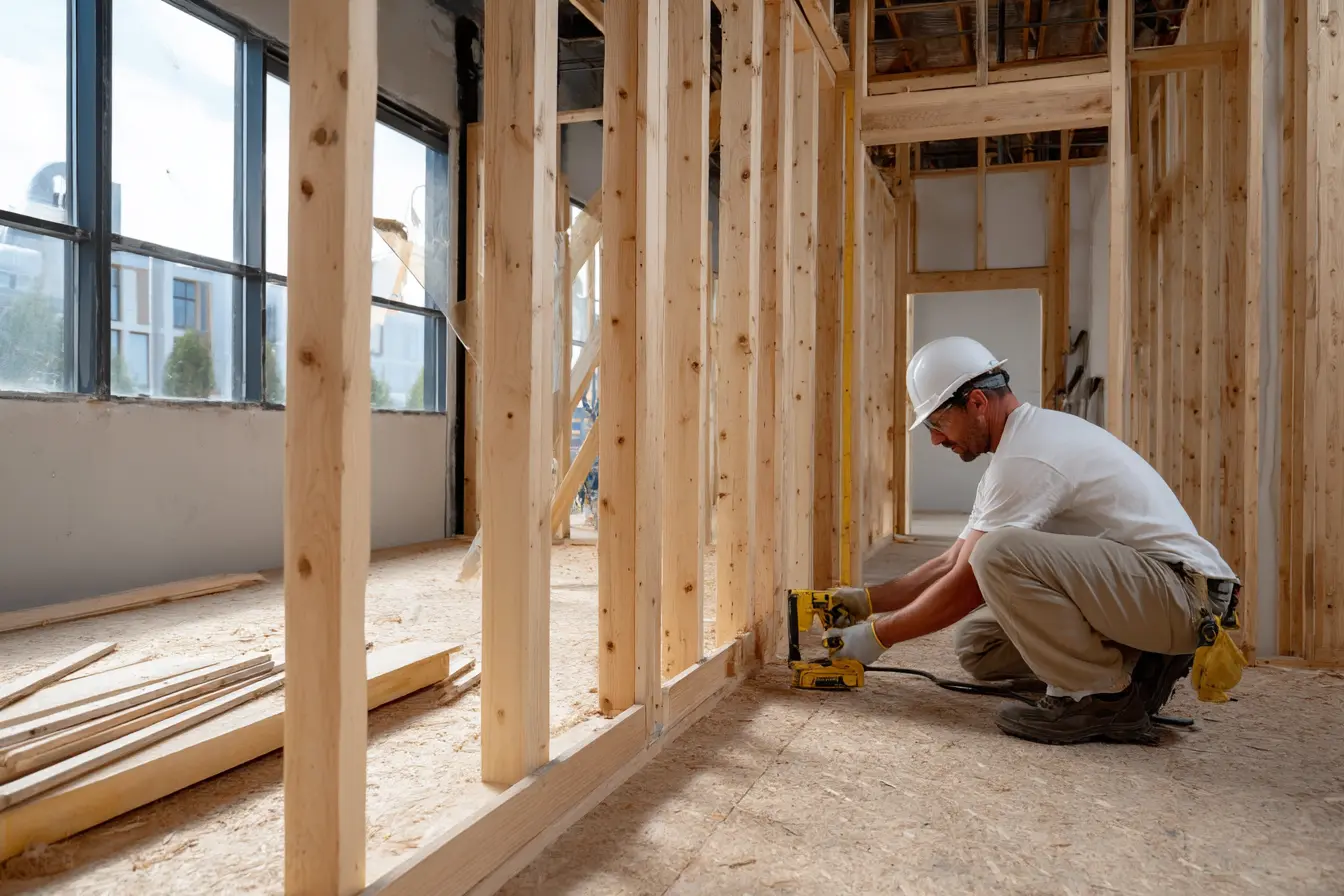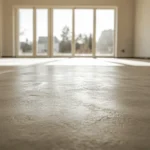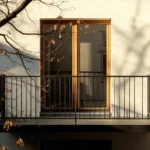
Last updated: May 26th, 2025
Looking to create a new room or divide an existing space in your home? Installing a stud partition wall is a practical and cost effective solution. This guide covers everything you need to know about stud wall costs in the UK. We’ll look at different stud wall types and labour costs, give you cost examples and show you the best ways to save money!
How Much Does a Stud Wall Cost Per M² in the UK?
The average stud wall installation cost ranges between £110 to £160 per m² in the UK. This includes material and labour. But costs can vary, depending on several factors like wall type, material, labour rates and features. The following is an overview for stud wall costs based on different specifications and sizes:
Average Stud Wall Cost per Square Metre
| Stud Wall Type | Materials | Labour | Total Cost |
|---|---|---|---|
| Basic Stud Wall | £50 – £65 | £60 – £75 | £110 – £140 |
| Insulated Stud Wall | £65 – £80 | £60 – £75 | £125 – £155 |
| Soundproofed Stud Wall | £80 – £100 | £70 – £85 | £150 – £185 |
| Fire-Rated Stud Wall | £85 – £105 | £70 – £85 | £155 – £190 |
Total Cost Examples (Based on Wall Size)
| Wall Size | Basic Wall | Insulated Wall | Soundproofed Wall |
|---|---|---|---|
| Small (5m²) | £550 – £700 | £625 – £775 | £750 – £925 |
| Medium (10m²) | £1,100 – £1,400 | £1,250 – £1,550 | £1,500 – £1,850 |
| Large (15m²) | £1,650 – £2,100 | £1,875 – £2,325 | £2,250 – £2,775 |
Money Saving Tip: Compare Stud Wall Prices in Your Area!
How much is Labour-only for a Stud Wall?
For a stud partition wall installation on average you can expect to pay for labour alone between £60 to £85 per m² or alternatively £250 to £350 per day. Here is a more detailed breakdown if you’re supplying materials yourself or just want to understand the labour costs:
Daily Rates:
- A skilled carpenter or builder typically charges between £250 and £300 per day for stud wall installation.
- In London and the South East, daily rates can increase to £280-£400.
- Most simple stud walls require 1-3 days of labour for the basic construction.
Per Square Metre Rates:
- Labour-only costs typically range from £60 to £85 per square metre for standard stud walls.
- For more complex work like load-bearing walls, expect to pay £85-£110 per square metre.
- These rates usually include framing, plasterboard installation, and basic finishing.
Additional Labour Costs:
- Plastering work is typically charged at £15-£30 per square metre (additional to the basic stud wall installation).
- Adding door frames requires approximately 2-4 hours of additional labour (£100-£200).
- Electrical work must be done by a qualified electrician at £50-£80 per hour.
- Skip hire for waste materials typically costs between £150 and £250, depending on size and location.
Time Estimates:
- A standard 3m × 2.4m stud wall typically takes 5-8 hours to construct (frame and plasterboard).
- Insulated and soundproofed walls take approximately 20-30% longer to install.
- Plastering and finishing add 1-2 additional days to the project timeline.
How Much Do Different Types of Stud Walls Cost?
The type of stud wall you choose will significantly impact the overall cost of your project. Here’s a breakdown of different stud wall types and their associated costs:
1. Standard Partition Wall:
A standard partition wall is the most basic type of stud wall, designed simply to divide space rather than bear any structural load.
- For a standard 2.4m high by 3m long partition wall, expect to pay between £800 and £1,000 in total.
- Materials typically cost between £250 and £350, with labour accounting for £550 to £650.
- This includes a timber frame, standard plasterboard on both sides, and basic finishing.
2. Insulated Stud Wall:
Insulated stud walls include additional materials to improve thermal or acoustic performance.
- For a 2.4m high by 3m long insulated wall, costs range from £900 to £1,120 in total.
- Materials costs increase to £350 to £450 due to the addition of insulation.
- These walls are ideal for exterior-facing rooms or when creating a home office or bedroom where temperature control is important.
3. Metal Stud Partition Wall:
Metal stud walls use galvanized steel framing instead of timber, offering higher fire resistance and stability.
- A 2.4m high by 3m long metal stud wall typically costs between £950 and £1,200 in total.
- Metal studs cost about 20-30% more than timber, but installation can be faster and more precise.
- These walls are ideal for commercial spaces, bathrooms, or kitchens where moisture resistance and fire safety are priorities.
4. Soundproofed Stud Wall:
Specifically designed to reduce noise transmission between rooms, soundproofed walls include acoustic insulation and sometimes specialist plasterboard.
- A 2.4m high by 3m long soundproofed wall typically costs between £1,080 and £1,330 in total.
- Materials costs range from £450 to £600 for acoustic insulation and sound-blocking plasterboard.
- These are particularly valuable for home theatres, music rooms, or bedrooms adjacent to living areas.
5. Glass Partition Wall:
Glass partition walls create visual separation while maintaining light flow and an open feel to your space.
- A 2.4m high by 3m long glass partition wall typically costs between £1,500 and £2,200 in total.
- Materials include tempered or laminated glass panels, aluminium framing, and specialized mounting hardware.
- These are perfect for modern offices, creating room divisions while maintaining natural light flow and visual connectivity.
How much to build a Stud Wall with a Door?
Adding a door to your stud wall increases the total cost by approximately 30-50% (including both materials and labour). For a standard stud wall (2.4m high by 3m wide) with a door, expect to pay between £1,000 and £1,400 in total.
This price includes the basic stud wall construction (£800-£1,000) plus a standard interior door package (£200-£400). The door package typically includes a pre-hung door in frame, door handles, and basic hardware. Premium door options, glazed doors, or fire-rated doors will add £150-£350 to this cost.
What Affects Your Stud Wall Costs?
Let’s take a look at the key factors that influence the overall stud partition wall installation cost:
1. Size and Height
The dimensions of your stud wall will significantly impact the cost. Larger walls require more materials and labour, increasing the overall expense. expense.
2. Wall Type
Whether you need a simple partition wall or a load-bearing wall will affect both materials and labour costs. Load-bearing walls require additional structural support and often need professional installation.
3. Materials
The quality and type of materials you choose, including timber, plasterboard, insulation, and finishes, will influence the total cost of your project.
4. Labour
If you plan to hire a professional for installation, labour costs can account for a significant portion of the total expense. Also your location matters, as labour rates vary across the UK, with London and the South East generally being pricier.
5. Additional Features
Including doors, windows, electrical outlets, or soundproofing will add to the base cost of your stud wall installation.
Saving Tips: How can I save on my Stud Wall Costs?
Here are our best money saving tips to keep your stud partition wall costs down without compromising quality:
1. Get Multiple Quotes
Get at least three quotes from different contractors to ensure you’re getting the best value for money.
2. Choose Standard Materials
Using standard plasterboard instead of specialist options where appropriate can reduce material costs by 30-50%.
3. Simplify the Design
Avoiding complicated angles or features like built-in shelving can significantly reduce both material and labour costs.
4. Buy Materials in Bulk
If you’re planning multiple walls or renovations, purchasing materials in larger quantities can often secure discounts.
5. Reuse Existing Materials
If you’re renovating, consider whether any existing timbers or materials can be reused for your new stud wall.
Frequently Asked Questions (FAQs)
How long does it take to install a stud wall?
For a standard 3m x 2.4m stud wall, expect for professional installation: About 1 day for basic construction and plasterboard installation, plus another 1-2 days for plastering and finishing.
Do I need planning permission to install a stud wall?
Generally, you don’t need planning permission for internal non-load-bearing walls. However, if you’re creating a separate dwelling, altering a listed building, or installing a load-bearing wall, you may need approval. Always check with your local authority if unsure.
How thick is a standard stud wall?
A standard stud wall is typically 100-125mm thick, including plasterboard on both sides. Insulated or soundproofed walls may be thicker, ranging from 125mm to 200mm depending on the insulation used.
Can I install a stud wall myself?
Yes, with good DIY skills, you can install a basic non-load-bearing stud wall yourself. However, load-bearing walls, walls containing electrical or plumbing elements, or walls requiring building regulation approval should be installed by professionals.
What’s the difference between a stud wall and a partition wall?
A stud wall refers specifically to a wall built with a timber or metal frame (studs) covered with plasterboard. A partition wall is a broader term that can include any wall that divides space, including stud walls, blockwork walls, or glass partitions.
Is it easy to remove a stud wall?
Yes, most stud walls are relatively easy to remove. The process typically involves removing plasterboard, cutting through the timber frame, and patching the floor and ceiling.




















